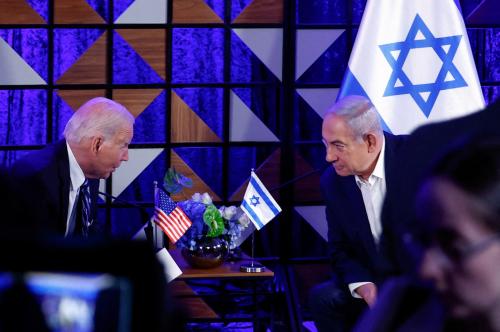This, by any measure, was Richard Clarke’s week. The former counterterrorism czar roiled Washington and the nation with his accusation that U.S. President George W. Bush had failed to understand the threat al-Qaeda posed to the United States before Sept. 11, and bungled the U.S. response afterward. It was a stinging indictment of the Bush presidency, delivered with stiletto precision. And the impassioned response from White House showed that it hurt.
Mr. Clarke categorically denounced Mr. Bush’s handling of the terrorist threat. He blamed the President for “continuing to work on Cold War issues” even as the al-Qaeda danger mounted. He says that National Security Adviser Condoleezza Rice ignored his memo in January, 2001, “asking for, urgently—underlined urgently—a cabinet-level meeting to deal with the impending al-Qaeda attack.”
Mr. Clarke criticized Mr. Bush’s response to 9/11 as well. He painted the President as convinced from the start that Iraq was responsible. In a damning indictment from a man who spent more than a decade working the counterterrorism beat, he concluded that everything Mr. Bush has “done after 9/11 has made us less safe.”
Here, we should put our affiliations on the table. Mr. Clarke was our boss when we served on the Clinton administration’s National Security Council staff. We know him as a committed public servant, dedicated—almost to the point of obsession—to confronting terrorism. We don’t doubt his rendition of events. They come from a man who has warned of impending doom—and argued for forceful preventive action—for many years.
Our testimonial, of course, will not convince Bush partisans, let alone administration officials. They portray Mr. Clarke as an out-of-the loop bureaucrat with an axe to grind, a book to peddle and a close friendship with Rand Beers, Senator John Kerry’s chief foreign-policy adviser.
That sour-grapes argument leaves unmentioned the fact that on Sept. 11, Ms. Rice asked Mr. Clarke to direct emergency-response efforts from the White House. It also glosses over the fact that Mr. Clarke was an ally of Vice-President Dick Cheney and deputy defence secretary Paul Wolfowitz during the 1991 Persian Gulf war, and favoured their call to march on Baghdad. Also left unmentioned is that Mr. Beers is himself a veteran of many administrations, and resigned his post as the senior counterterrorism official on the NSC staff in 2003 to protest what he saw as Mr. Bush’s mishandling of the terrorist threat.
The vehemence with which administration officials have attacked Mr. Clarke’s motives brings to mind the old lawyer’s joke: When the facts are with you, pound the facts. When the facts are against you, pound the table.
Why are administration officials pounding the table so hard? Because confirmation of Mr. Clarke’s basic accusations comes from none other than George W. Bush himself.
Take the charge that the Mr. Bush did not make fighting al-Qaeda a priority before Sept. 11. In late 2001, Mr. Bush told the journalist Bob Woodward that “there was a significant difference in my attitude after Sept. 11. I was not on point.” Mr. Bush knew Osama bin Laden was a menace. “But I didn’t feel the sense of urgency, and my blood was not nearly as boiling.”
Or take Mr. Clarke’s charge that Mr. Bush immediately sought to link the attacks in New York and Washington to Iraq. According to the notes of national-security meetings that the White House gave Mr. Woodward so he could write his book, Bush at War, the President ended an early debate over how to respond to Sept. 11 by saying, “I believe Iraq was involved, but I’m not going to strike them now.” At a later meeting, he linked Saddam Hussein to the attacks: “He was probably behind this in the end.”
Those admissions highlight a broader, more troubling point that Mr. Clarke’s accusations raise, which is that Mr. Bush does not understand the threat we confront. For Mr. Bush and his advisers it is not al-Qaeda that is the real danger so much as the states that supposedly support it. Thus, a Defence Department spokesman, responding to Mr. Clarke’s claim that Mr. Wolfowitz did not take the al-Qaeda terrorist threat seriously, said Mr. Wolfowitz did see al-Qaeda “as a major threat to U.S. security, the more so because of the state support it received from the Taliban and because of its possible links to Iraq.”
The assumption driving Mr. Bush’s war on terrorism is that the United States can win by targeting rogue states and the tyrants who rule them. The war in Afghanistan was about ousting the Taliban and denying al-Qaeda a sanctuary; the Iraq war was about ousting Saddam.
That view of the terrorist threat is deeply flawed, quite apart from the dubious claims about ties between al-Qaeda and Iraq. Al-Qaeda is a transnational network of terrorists, less like a state than like a non-governmental organization or multinational corporation with multiple independent franchises. It thrives on an Islamist ideology, and extends its presence to the far reaches of the globe—not just in rogue and failed states, but within the West as well. Its terrorists can strike—whether in Bali, Casablanca, Riyadh, Istanbul, Madrid or New York and Washington—without the direct support of states. That is what makes it so frightening.
Mr. Clarke’s charges have stung the Bush administration not just because of the stature of the accuser, but because at their core, they say that more than two years after the worst terrorist attack in history, the President and his advisers still don’t get what happened.
That is the true, and alarming, message of this week’s debate.



Commentary
Op-edTrust Clarke: He’s Right About Bush
March 26, 2004